

Vol 3, Issue 3 • Spring 2013
Download a full copy
G. Willow Wilson
The 2013 Lubar Visiting Scholar will come to Madison in October
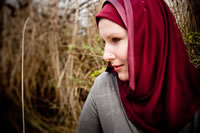 The Lubar Institute is thrilled to announce that G. Willow Wilson, author of critically acclaimed books and comics, will serve as our annual fall visiting scholar on October 20 and 21, 2013.
The Lubar Institute is thrilled to announce that G. Willow Wilson, author of critically acclaimed books and comics, will serve as our annual fall visiting scholar on October 20 and 21, 2013.
Wilson’s highly praised memoir, The Butterfly Mosque (Grove/Atlantic, 2010), recounts her story of converting to Islam and falling in love with an Egyptian man in a post-9/11 world. Her first novel, Alif the Unseen (Grove Press, 2012), nominated for the Women’s Prize for Fiction, introduces the reader to the adventures of the title character, a “hacktivist” in an unnamed emirate during the rise of the information age.
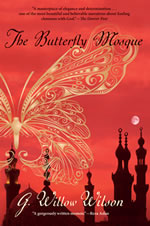 While on campus, Wilson will deliver a public lecture, in partnership with the Wisconsin Book Festival, on Sunday, October 20. On Monday, October 21, she will hold small-group conversations with UW students, faculty, the Muslim Student Association, and members of the greater Madison community.
While on campus, Wilson will deliver a public lecture, in partnership with the Wisconsin Book Festival, on Sunday, October 20. On Monday, October 21, she will hold small-group conversations with UW students, faculty, the Muslim Student Association, and members of the greater Madison community.
Look for more information about Wilson’s visit on the Lubar Institute website later this summer, and visit gwillowwilson.com.
![]()
From the Director
Charles Cohen
 My previous column reported on my developing a course that braids the histories of Judaism, Christianity, and Islam, presenting them as traditions that evolved in contact with each other over the course of four thousand years. I wrote before reviews were available, but students did evaluate the class quite positively (4.58 on a 5.0 scale), many indicating that it afforded them a completely new perspective on how to think about the Abrahamic religions. I will teach the syllabus again this coming fall, this time as part of a First-year Interest Group (FIG), in which a group of frosh take three linked classes so that they grow together both socially and intellectually. The FIG includes History 200, “Christian Origins and Jewish Transformations,” and Integrated Liberal Studies 203, “Western Culture: Literature and the Arts I.” The course has had—and I trust will continue to have—a salutary impact on students. It has also furthered my thinking about the connection between the Lubar Institute’s own braided missions.
My previous column reported on my developing a course that braids the histories of Judaism, Christianity, and Islam, presenting them as traditions that evolved in contact with each other over the course of four thousand years. I wrote before reviews were available, but students did evaluate the class quite positively (4.58 on a 5.0 scale), many indicating that it afforded them a completely new perspective on how to think about the Abrahamic religions. I will teach the syllabus again this coming fall, this time as part of a First-year Interest Group (FIG), in which a group of frosh take three linked classes so that they grow together both socially and intellectually. The FIG includes History 200, “Christian Origins and Jewish Transformations,” and Integrated Liberal Studies 203, “Western Culture: Literature and the Arts I.” The course has had—and I trust will continue to have—a salutary impact on students. It has also furthered my thinking about the connection between the Lubar Institute’s own braided missions.
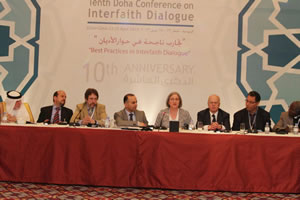
Lubar Institute Director Charles Cohen, at the Tenth Annual Conference of the Doha International Center for Interfaith Dialogue (third from left).
My thinking was stimulated by an invitation to present a paper at the Tenth Annual Conference of the Doha International Center for Interfaith Dialogue, whose theme this year was “best practices.” The assignment made me think about the course’s larger purview. As an instructor, I cannot assume that students enter the classroom with any interest in increasing interfaith understanding. What, if anything, might they take away? The answer, I hypothesized, is that the course contributes to interfaith understanding less through providing content per se than by instilling what I might call an intellectual habit. In teaching an Abrahamic history, I emphasize the historical interconnectedness of the traditions and require that students constantly juxtapose them. As they do so, they cultivate the practice of regularly locating one tradition within the context of the others, stimulating a regularized intellectual reflex. I rehearsed this conclusion on a panel that included clergy and scholars from The Gambia, Syria, Austria, Lebanon, and Tunisia, and was gratified when several of them remarked how promising the approach sounded. I was equally pleased at having gained greater insight into the interface between the Lubar Institute’s scholarly and civic missions as well as how this knowledge sharpens my sense of the Institute’s place at a public university, something I hope to expand upon in a future column.
![]()
2012–2013 Lubar Institute Fellows
This year’s Lubar Institute Undergraduate Fellows enjoyed a busy semester. Even before classes resumed this past January, Naman Said, Steve Buting, Saad Siddiqui and Meghan Walker, along with the Institute’s Assistant Director, Ulrich Rosenhagen, participated in the UW Housing In-Service Training Day for campus resident assistants, leading the workshop “Hijab, Shabbat, and Confession, Oh My!: Interreligious Understanding in the Dorms.” This event was followed soon after by another interfaith training, this one for students, in Sellery Hall, a large undergraduate dorm which houses over 1,000 students.
The highlight for many of our eight Fellows and over twenty Forum members this past semester, however, has been taking the leadership role in planning and executing the Lubar Institute’s first All-Campus Interfaith Day of Service, co-sponsored by the UW Office for Equity and Diversity.
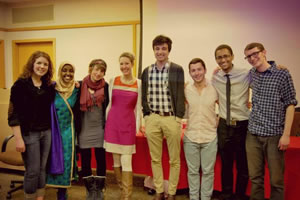 2012–2013 Undergraduate Fellows (left to right): Jessica Hare, Naman Siad, Rachel Lerman, Meghan Walker, Saad Siddiqui, Ben Agatston, Tim Baerg, and Steve Buting.
2012–2013 Undergraduate Fellows (left to right): Jessica Hare, Naman Siad, Rachel Lerman, Meghan Walker, Saad Siddiqui, Ben Agatston, Tim Baerg, and Steve Buting.In some ways, the Day of Service was in fact more of weekend event, with a kick-off mixer held on Saturday, April 20. This social event, held in Lowell Hall, allowed students of diverse faith backgrounds to mingle, participate in a beach ball interfaith trivia challenge, and enjoy the sounds of Jewop, UW–Madison’s only Jewish a capella group.
On Sunday, April 21, the Fellows invited students from across campus, regardless of their religious identity, to serve the greater Madison community by taking part in one of many service projects, organized by the Fellows across the city. Many students participated in a food drive for the Goodman Center Food Pantry, which serves families in need on Madison’s east side. Others served meals at the Salvation Army, at Port St. Vincent (a shelter operated by the Society of St. Vincent De Paul) and through the Lutheran Campus Center’s Savory Sunday program. But regardless of where they were assigned, all the students agreed that getting off-campus, fulfilling their religions’ obligation for social action, and spending time with students they may not otherwise have met was a deeply meaningful experience.
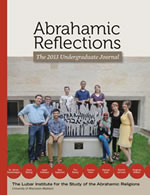 Read a PDF version of the 2013 Undergraduate Journal, written by this year’s Fellows.
Read a PDF version of the 2013 Undergraduate Journal, written by this year’s Fellows.May 7 was a bittersweet day for the Fellows, as they “graduated” from the Institute and bid goodbye to the staff and each other. Some outgoing Fellows will return to campus next year, but three of them—Rachel Lerman, Saad Siddiqui, and Meghan Walker—are graduating from UW–Madison. At the staff’s request, the Fellows provided feedback on their experiences and suggested ways of improving the program. On the whole, though, they relished their time at the Institute (as their essays in the 2013 Undergraduate Journal demonstrate).
The Fellows had the opportunity to pass their enthusiasm to the incoming class of eight Fellows, who attended their first Institute event. This “handing of the torch” from one class to the next has become a tradition at the Institute. Based on their applications and current involvement on campus, the incoming class looks quite capable of equaling the record of the departing class, which extend the Institute’s influence on campus farther than any previous group.
Back to Contents
